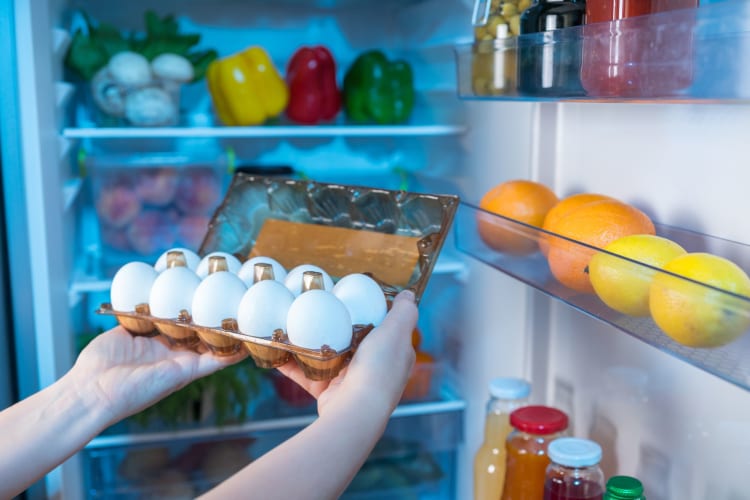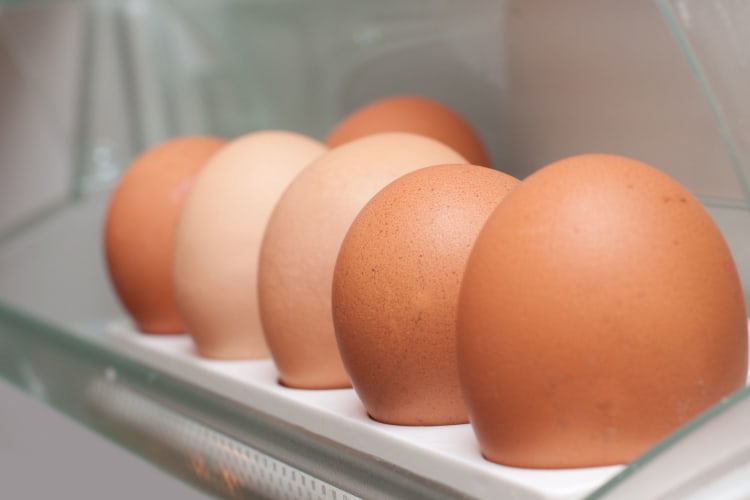Do Eggs Need to Be Refrigerated?

So you’re getting ready to unpack your groceries and put them away when a thought strikes you: Do eggs need to be refrigerated?
Sure, you’ve always refrigerated them in the past, but you’ve never actually thought about whether or not it was necessary. Do fresh eggs need to be refrigerated at all, or are you wasting valuable fridge space?
We’re here to dive into whether or not your eggs need to go in the fridge. Read on to learn more.
- Do Eggs Need to Be Refrigerated?
- Why Don't Other Countries Refrigerate Their Eggs?
- How Long Do Eggs Keep in the Fridge?
- Do Hard-Boiled Eggs Need to Be Refrigerated?
- How Long Do Hard-Boiled Eggs Last in the Fridge?
- Tips for Buying and Storing Eggs
- Our Favorite Recipes That Call for Eggs
Do Eggs Need to Be Refrigerated?
Do fresh eggs need to be refrigerated? In short, if you’re in the United States or Canada, yes. Refrigeration helps keep fresh eggs safe for a longer period of time.
Eggs have a protective layer called a cuticle, which helps seal the pores on the shell and prevents bacteria from entering. This natural protective layer can be compromised over time, making the eggshell more susceptible to contamination. As a matter of fact, washing and pasteurizing the eggs can actually remove that protective layer (even though washing and pasteurizing are good things).
Refrigeration at 40 degrees Fahrenheit or lower slows down the growth of bacteria, reducing the risk of foodborne illnesses caused by Salmonella. Salmonella bacteria can infect even fresh, uncracked eggs and can cause highly unpleasant gastrointestinal symptoms.

Why Don't Other Countries Refrigerate Their Eggs?
In countries where eggs are not refrigerated, there is often a different approach to egg washing. This means that how long eggs can sit out differs depending on which part of the world you're in. In countries in Europe and Asia, for instance, the cuticle won’t be removed from the eggshell, and it can still protect the egg. In this case, refrigeration isn’t necessary.
On a similar note, in some countries, there’s a more “farm-to-table” approach. People use their eggs quickly, so they don’t rely on refrigeration to extend the shelf life.

How Long Do Eggs Keep in the Fridge?
Eggs can last for a fairly long time in the refrigerator. As a matter of fact, as long as they’re properly stored, you can expect to still have safe eggs for about four to five weeks after you purchased them. While a “use by” date is helpful, your eggs may well be fine long after that date has passed.
What do you do if you have a fridge full of eggs that you’ve kept for weeks? Consider taking some cooking classes near you to learn how to use them. Whether you take cooking classes in NYC, Calgary or even online cooking classes, you’re sure to get some inspiration. You’ll use up those eggs in no time.

Do Hard-Boiled Eggs Need to Be Refrigerated?
If fresh eggs need to be refrigerated, do eggs need to be refrigerated if they’ve been hard-boiled?
Yes. Like most cooked foods, you need to refrigerate hard-boiled eggs. After cooking, eggs can be susceptible to bacterial contamination if left at room temperature for an extended period of time. Refrigeration slows down the growth of bacteria and helps to maintain the safety of your hard-boiled eggs.

How Long Do Hard-Boiled Eggs Last in the Fridge?
Refrigerated hard-boiled eggs can typically be safely consumed within one week. Unlike fresh eggs, you can’t leave hard-boiled eggs in the refrigerator for weeks at a time. Refrigerating hard-boiled eggs can extend their shelf life, but not by long.
The refrigerator helps to slow down the natural deterioration process of hard-boiled eggs. Of course, if your eggs look or smell unusual before the week is up, it’s best to throw them away. It’s always better to be safe rather than sorry.

Tips for Buying and Storing Eggs
How can you ensure that you always have the freshest eggs? Here are a few helpful tips.
-
Store them in their original cartons. This way, you can see the sell-by date and the eggs will be protected from taking on the smells of other foods in the fridge.
-
Always check eggs before buying them. Shift them around in the carton one by one to check for cracks.
-
Avoid the door. Storing eggs in the door can leave them susceptible to falling and breaking. The temperature is also less stable there.
-
Store eggs pointy side down. Yes, this is the opposite of how they probably are when you buy them, but trust us. It will keep the air sac on the blunt side, where it belongs, so your eggs stay fresher for longer.

Our Favorite Recipes That Call for Eggs
What are you going to do with all of those eggs waiting in your refrigerator? With all the options for different types of cooked eggs, you’re in luck. Eggs are incredibly versatile. These are some of our favorite tasty egg dishes:
So do eggs need to be refrigerated? Yes! Whether they’re fresh or cooked, you should keep them in the refrigerator if you want them to stay safe to eat. If you’ve got eggs nearing their expiration date, it’s time to cook a nice, eggy meal that will fight food waste as well as please your palate.
For even more ways to explore your favorite foods, check out other experiences happening on Cozymeal.
